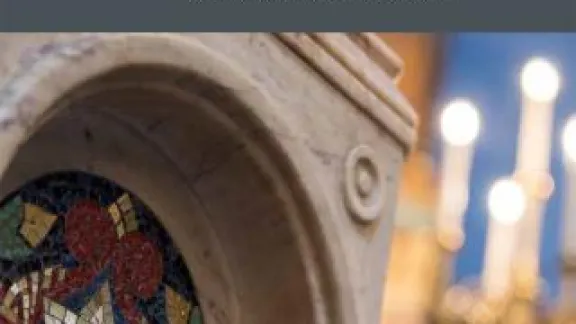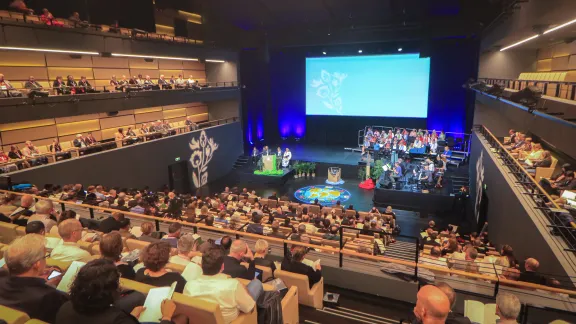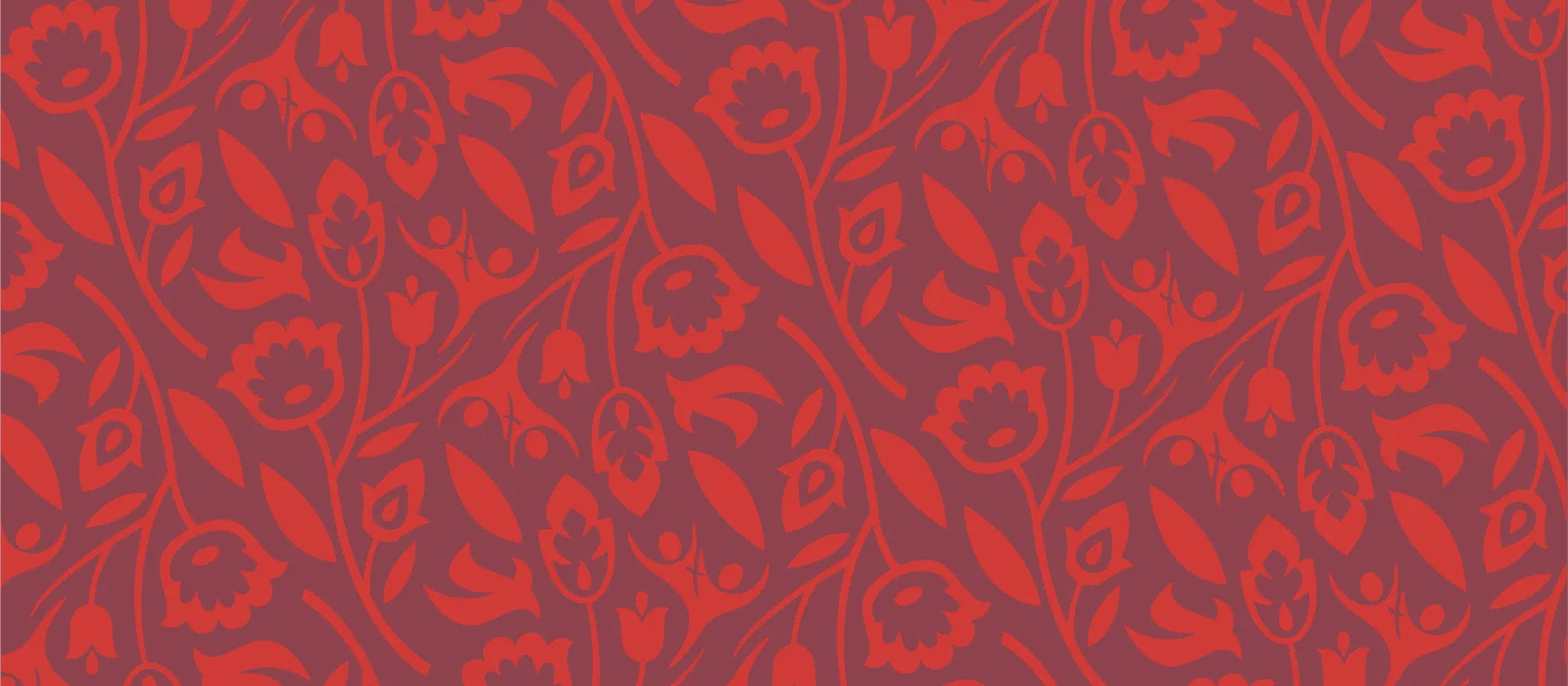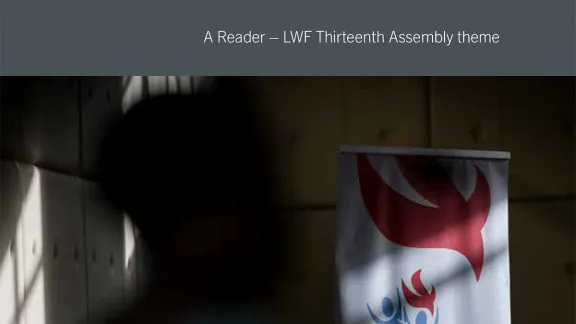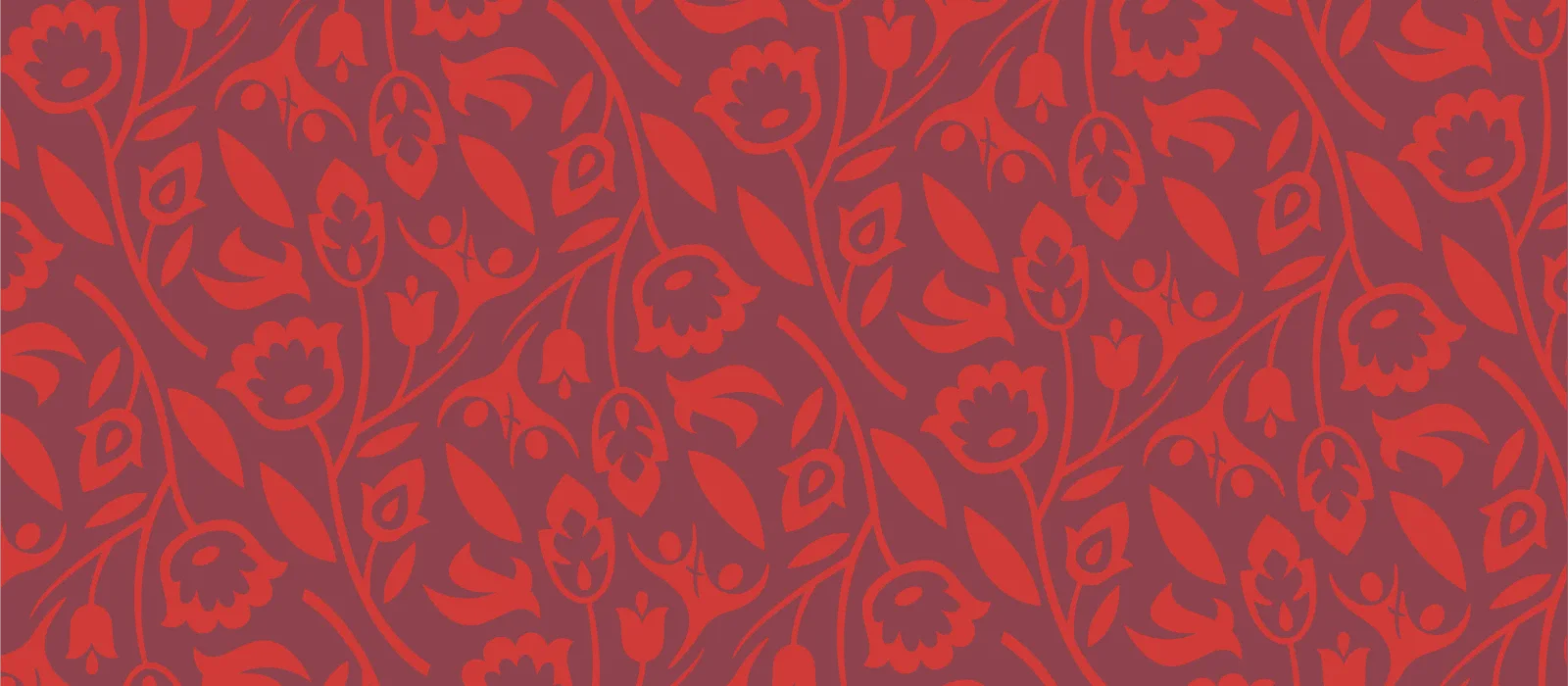News
LWF leaders lay a wreath as Assembly delegates visit the former Nazi concentration camps
(LWI) - Auschwitz-Birkenau, where over a million people, mainly Jews, were murdered, alongside others deemed dangerous or undesirable by the Nazi regime.
On the third day of The Lutheran World Federation (LWF) Assembly in Krakow, delegates spent the afternoon visiting the memorial and museum in the former concentration camps. In small groups, they walked through the gas chambers, past the ovens where bodies were burnt, seeing piles of human hair, clothes and personal items that were stripped from victims as they were sent to die.
In Auschwitz memorial and museum, in front of a wall where numerous prisoners were shot, LWF President Archbishop Dr Panti Filibus Musa and General Secretary Rev. Dr Anne Burghardt laid a wreath of flowers, accompanied by Bishop Adrian Korczago from the Cieszyn diocese of the Evangelical Church of the Augsburg Confession in Poland, where the camps are located. The two LWF leaders offered a prayer "that we do not remain indifferent,” so that “what we witness here is never repeated.”
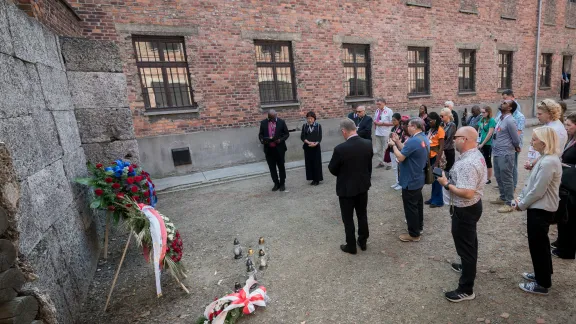
LWF President Archbishop Dr Panti Filibus Musa, LWF General Secretary Rev. Dr Anne Burghardt, Presiding Bishop Jerzy Samiec of the Evangelical Church of the Augsburg Confession in Poland, and Bishop Adrian Korczago of the Cieszyn diocese lead participants in a moment of prayer at the Death Wall at the Memorial and Museum Auschwitz-Birkenau as they visit as part of the programme of the LWF Thirteenth Assembly. Photo: LWF/Albin Hillert
How long, O Lord?
“We realize that not everybody is familiar with the history of Europe and the Second World War,” said Korczago, “but we see Auschwitz as a universal symbol of the various tragedies and atrocities that are happening to people all over the world. This is not just something that occurred almost 100 years ago, but something that keeps happening again in different regions of the world.”
At Birkenau, at the end of the visit, delegates walked silently along a ‘prayer path’, marked on the ground by a piece of grey cloth that had been knotted at intervals to resemble the barbed wire that still surrounds the camps. At one point along the path, visitors were invited to use an ink stamp to mark the cloth with the words ‘How long, O Lord?’, the anguished cry of King David recorded in Psalm 13.
At another point, visitors were given dried flowers to crush and scatter on the sandy ground, before joining together to sing a Kyrie, the traditional Christian prayer of lament. In the words of the Psalmist, they prayed: “Out of the depths we cry to you, O Lord. Hear our voice. Hear our speechless cry.”
Out of the depths we cry to you, O Lord. Hear our voice. Hear our speechless cry.
Korczago noted: “For us, the most important message of this visit is to make people reflect on the fact that you cannot stay passive, you cannot be indifferent to the way that people are being tortured and persecuted because of their religion, their gender, or other aspects of their human condition. By witnessing these very drastic images of trauma, torture and death, we hope visitors may reflect on the different types of persecution that go on in the world today.”
The visit to Auschwitz memorial and museum, he said, is an integral part of the LWF Thirteenth Assembly, which is focusing on the theme “One Body, One Spirit, One Hope” [Ephesians 4:4]. “If we are all part of the One Body,” he stressed, “we cannot be insensitive to the suffering of another member or a group of members. The Holy Spirit has the power to move our hearts so that we do not remain indifferent but become clearer in our understanding of the suffering of our sisters and brothers.”
As darkness fell, the last delegates moved away, retracing their steps beside the train tracks that brought so many men, women and children to their deaths. Each group left a lantern beside the place where they had stood to pray, mindful that the following day they would come together again for a moment of shared confession, as the Assembly theme moves from lament for broken bodies into the promise of new hearts. Bishop Korczago concluded: We put our trust in Christ, knowing that hope will prevail - even in the face of such cruelty and malice as represented here at Auschwitz Birkenau.”
15 SEP 2023
Indonesian theologian urges Assembly delegates to promote unity by practicing hospitality
(LWI) - As a communion of churches, we are called “to keep the Body together, be it the unity of churches, [or] be it defending human bodies from violence and dominance.” In the first of three plenary sessions exploring the theme of The Lutheran World Federation (LWF) Thirteenth Assembly, “One Body, One Spirit, One Hope,” Indonesian theologian Rev. Dr Benny Sinaga spoke about the many ways in which human bodies are broken and suffer from hunger, conflict, discrimination, and oppression.
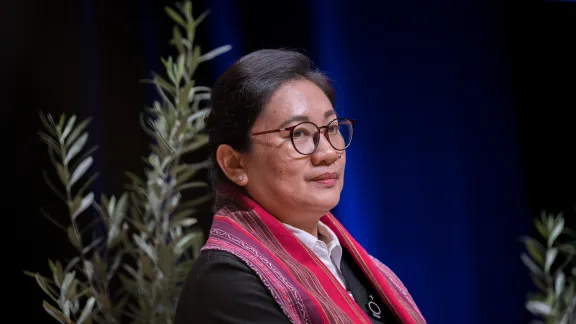
Indonesian theologian Rev. Dr Benny Sinaga, delivering the keynote presentation on “One Body” during the thematic plenary session of the third day at LWF’s Thirteenth Assembly in Kraków, Poland. Photo: LWF/Albin Hillert
Speaking on day three of the 13 to 19 September Assembly, Sinaga, a New Testament scholar and President of the Sekolah Tinggi Biblevrouw theological seminary for women in North Sumatra, reflected on what it means for the churches to be called into the one, undivided body of Christ through the work of the one Holy Spirit. “The Spirit of God is one; the church, therefore, must also be one; it is unthinkable that it could be divided,” she said.
Yet, every day, she continued, “we find and experience brokenness through war, injustice, violence, polarization, discrimination, hate, hunger.” She pointed to the nearby Auschwitz-Birkenau memorial and museum, which Assembly participants are visiting, but also to contemporary horrors such as the conflict in neighboring Ukraine.
If some parts of this world are hungry, then the world be sick.
Rev. Dr Benny Sinaga, President of the Sekolah Tinggi Biblevrouw seminary in North Sumatra, Indonesia
Child malnutrition and hunger in countries such as Chad, Congo, Haiti, Madagascar or Yemen are also scourges afflicting so many bodies, causing sickness and suffering in poorer parts of the world today, Sinaga said. “If some parts of this world are hungry, then the world will be sick,” she warned.
Speaking of the COVID-19 pandemic, she recalled the way in which the virus “tortures the spirit, the breath, the lungs,” and has killed millions of people, leaving families and churches bereaved and crying. From this experience, she said, “we understand more how to value the air which is inhaled and exhaled every second of the life in the body, to value the meaning of the family and the church worshipping together as the fellowship in one body, and to value those who are always taking care of us.”
Building equality, inclusion, unity
Sinaga also noted the way people continue to be excluded and suffer discrimination on grounds of skin color, economic status, education and gender. In her own country, Indonesia, she said “some women (and also men) prefer buying skincare whitening” because they worry about being rejected or looked down upon. She urged delegates from the 99 countries where LWF is present to greet and get to know each other, to build and strengthen relationships, not just during the Assembly in Krakow, but also afterwards when “we fall back into our regular or usual tasks.”
As a young female pastor, Sinaga pointed to the way women continue to suffer from violence, discrimination, subordination, lack of access to healthcare or participation in political life. But she also noted the progress achieved in her church, the Protestant Christian Batak Church (HKBP), founded by German missionaries in the 1860s. At her seminary, women are trained as preachers and leaders, while the church ordained its first female Batak pastors in 1986. More than two thousand women have now been ordained to various ministries including pastors, preachers, deaconesses, evangelists and elders.
Sinaga urged participants to promote equality, inclusion and to build up the unity of the body of Christ by practicing “hospitality as a virtue to welcome others.” Recalling the way “Jesus welcomes every sinner to have a banquet at His table,” she said, “the cross is the self-giving of the one for many.” She concluded: “Unity of the body is a fruit of Christ’s self-sacrifice which breaks down enmity, discrimination, rejection, polarization, war, inequality, hate and injustice.”
Responses from South Africa and Germany
Responding to this first thematic presentation, South African Bishop Naledzani Josephine Sikhwari of the Evangelical Lutheran Church in Southern Africa (ELCSA) talked about the many different ethnicities and languages that make up her church. “ELCSA is diverse due to culture, language, ethnic groups, as well as the background of the missionaries who brought the gospel to Southern Africa,” she said. “Unity is not easy within ELCSA but in diversity we strive for the gospel,” she added. Working for unity in one body, she stressed, requires “inclusivity,” “integrity” and “treating each other with dignity.”
German Professor Dr Bernd Oberdorfer from the University of Augsburg also offered a response, reflecting on the Shoah, during which the bodies of Jewish men, women and children were burnt “to extinguish any traces of their existence.” Though the Shoah was not initiated or conducted by the church, he noted, the antisemitism of the Nazis was built “on a long history of Christian anti-Judaism which was still widespread in the Christian congregations of the early 20th century.
Thus the “deliberate exclusion of our Jewish brothers and sisters from the people of God had an important impact on the exclusion, discrimination and persecution” of the Jewish people,” he said, weakening the willingness of Christians to defend the civic and human rights of Jews. Oberdorfer welcomed the recent LWF educational resource on “renewing Jewish-Christian relations” which was an important part of preparations for the Krakow Assembly and culminated in the recently published document Hope for the Future.
15 SEP 2023
Indonesian theologian urges Assembly delegates to promote unity by practicing hospitality
(LWI) - As a communion of churches, we are called “to keep the Body together, be it the unity of churches, [or] be it defending human bodies from violence and dominance.” In the first of three plenary sessions exploring the theme of The Lutheran World Federation (LWF) Thirteenth Assembly, “One Body, One Spirit, One Hope,” Indonesian theologian Rev. Dr Benny Sinaga spoke about the many ways in which human bodies are broken and suffer from hunger, conflict, discrimination, and oppression.

Indonesian theologian Rev. Dr Benny Sinaga, delivering the keynote presentation on “One Body” during the thematic plenary session of the third day at LWF’s Thirteenth Assembly in Kraków, Poland. Photo: LWF/Albin Hillert
Speaking on day three of the 13 to 19 September Assembly, Sinaga, a New Testament scholar and President of the Sekolah Tinggi Biblevrouw theological seminary for women in North Sumatra, reflected on what it means for the churches to be called into the one, undivided body of Christ through the work of the one Holy Spirit. “The Spirit of God is one; the church, therefore, must also be one; it is unthinkable that it could be divided,” she said.
Yet, every day, she continued, “we find and experience brokenness through war, injustice, violence, polarization, discrimination, hate, hunger.” She pointed to the nearby Auschwitz-Birkenau memorial and museum, which Assembly participants are visiting, but also to contemporary horrors such as the conflict in neighboring Ukraine.
If some parts of this world are hungry, then the world be sick.
Rev. Dr Benny Sinaga, President of the Sekolah Tinggi Biblevrouw seminary in North Sumatra, Indonesia
Child malnutrition and hunger in countries such as Chad, Congo, Haiti, Madagascar or Yemen are also scourges afflicting so many bodies, causing sickness and suffering in poorer parts of the world today, Sinaga said. “If some parts of this world are hungry, then the world will be sick,” she warned.
Speaking of the COVID-19 pandemic, she recalled the way in which the virus “tortures the spirit, the breath, the lungs,” and has killed millions of people, leaving families and churches bereaved and crying. From this experience, she said, “we understand more how to value the air which is inhaled and exhaled every second of the life in the body, to value the meaning of the family and the church worshipping together as the fellowship in one body, and to value those who are always taking care of us.”
Building equality, inclusion, unity
Sinaga also noted the way people continue to be excluded and suffer discrimination on grounds of skin color, economic status, education and gender. In her own country, Indonesia, she said “some women (and also men) prefer buying skincare whitening” because they worry about being rejected or looked down upon. She urged delegates from the 99 countries where LWF is present to greet and get to know each other, to build and strengthen relationships, not just during the Assembly in Krakow, but also afterwards when “we fall back into our regular or usual tasks.”
As a young female pastor, Sinaga pointed to the way women continue to suffer from violence, discrimination, subordination, lack of access to healthcare or participation in political life. But she also noted the progress achieved in her church, the Protestant Christian Batak Church (HKBP), founded by German missionaries in the 1860s. At her seminary, women are trained as preachers and leaders, while the church ordained its first female Batak pastors in 1986. More than two thousand women have now been ordained to various ministries including pastors, preachers, deaconesses, evangelists and elders.
Sinaga urged participants to promote equality, inclusion and to build up the unity of the body of Christ by practicing “hospitality as a virtue to welcome others.” Recalling the way “Jesus welcomes every sinner to have a banquet at His table,” she said, “the cross is the self-giving of the one for many.” She concluded: “Unity of the body is a fruit of Christ’s self-sacrifice which breaks down enmity, discrimination, rejection, polarization, war, inequality, hate and injustice.”
Responses from South Africa and Germany
Responding to this first thematic presentation, South African Bishop Naledzani Josephine Sikhwari of the Evangelical Lutheran Church in Southern Africa (ELCSA) talked about the many different ethnicities and languages that make up her church. “ELCSA is diverse due to culture, language, ethnic groups, as well as the background of the missionaries who brought the gospel to Southern Africa,” she said. “Unity is not easy within ELCSA but in diversity we strive for the gospel,” she added. Working for unity in one body, she stressed, requires “inclusivity,” “integrity” and “treating each other with dignity.”
German Professor Dr Bernd Oberdorfer from the University of Augsburg also offered a response, reflecting on the Shoah, during which the bodies of Jewish men, women and children were burnt “to extinguish any traces of their existence.” Though the Shoah was not initiated or conducted by the church, he noted, the antisemitism of the Nazis was built “on a long history of Christian anti-Judaism which was still widespread in the Christian congregations of the early 20th century.
Thus the “deliberate exclusion of our Jewish brothers and sisters from the people of God had an important impact on the exclusion, discrimination and persecution” of the Jewish people,” he said, weakening the willingness of Christians to defend the civic and human rights of Jews. Oberdorfer welcomed the recent LWF educational resource on “renewing Jewish-Christian relations” which was an important part of preparations for the Krakow Assembly and culminated in the recently published document Hope for the Future.
15 SEP 2023
Indonesian theologian urges Assembly delegates to promote unity by practicing hospitality
(LWI) - As a communion of churches, we are called “to keep the Body together, be it the unity of churches, [or] be it defending human bodies from violence and dominance.” In the first of three plenary sessions exploring the theme of The Lutheran World Federation (LWF) Thirteenth Assembly, “One Body, One Spirit, One Hope,” Indonesian theologian Rev. Dr Benny Sinaga spoke about the many ways in which human bodies are broken and suffer from hunger, conflict, discrimination, and oppression.

Indonesian theologian Rev. Dr Benny Sinaga, delivering the keynote presentation on “One Body” during the thematic plenary session of the third day at LWF’s Thirteenth Assembly in Kraków, Poland. Photo: LWF/Albin Hillert
Speaking on day three of the 13 to 19 September Assembly, Sinaga, a New Testament scholar and President of the Sekolah Tinggi Biblevrouw theological seminary for women in North Sumatra, reflected on what it means for the churches to be called into the one, undivided body of Christ through the work of the one Holy Spirit. “The Spirit of God is one; the church, therefore, must also be one; it is unthinkable that it could be divided,” she said.
Yet, every day, she continued, “we find and experience brokenness through war, injustice, violence, polarization, discrimination, hate, hunger.” She pointed to the nearby Auschwitz-Birkenau memorial and museum, which Assembly participants are visiting, but also to contemporary horrors such as the conflict in neighboring Ukraine.
If some parts of this world are hungry, then the world be sick.
Rev. Dr Benny Sinaga, President of the Sekolah Tinggi Biblevrouw seminary in North Sumatra, Indonesia
Child malnutrition and hunger in countries such as Chad, Congo, Haiti, Madagascar or Yemen are also scourges afflicting so many bodies, causing sickness and suffering in poorer parts of the world today, Sinaga said. “If some parts of this world are hungry, then the world will be sick,” she warned.
Speaking of the COVID-19 pandemic, she recalled the way in which the virus “tortures the spirit, the breath, the lungs,” and has killed millions of people, leaving families and churches bereaved and crying. From this experience, she said, “we understand more how to value the air which is inhaled and exhaled every second of the life in the body, to value the meaning of the family and the church worshipping together as the fellowship in one body, and to value those who are always taking care of us.”
Building equality, inclusion, unity
Sinaga also noted the way people continue to be excluded and suffer discrimination on grounds of skin color, economic status, education and gender. In her own country, Indonesia, she said “some women (and also men) prefer buying skincare whitening” because they worry about being rejected or looked down upon. She urged delegates from the 99 countries where LWF is present to greet and get to know each other, to build and strengthen relationships, not just during the Assembly in Krakow, but also afterwards when “we fall back into our regular or usual tasks.”
As a young female pastor, Sinaga pointed to the way women continue to suffer from violence, discrimination, subordination, lack of access to healthcare or participation in political life. But she also noted the progress achieved in her church, the Protestant Christian Batak Church (HKBP), founded by German missionaries in the 1860s. At her seminary, women are trained as preachers and leaders, while the church ordained its first female Batak pastors in 1986. More than two thousand women have now been ordained to various ministries including pastors, preachers, deaconesses, evangelists and elders.
Sinaga urged participants to promote equality, inclusion and to build up the unity of the body of Christ by practicing “hospitality as a virtue to welcome others.” Recalling the way “Jesus welcomes every sinner to have a banquet at His table,” she said, “the cross is the self-giving of the one for many.” She concluded: “Unity of the body is a fruit of Christ’s self-sacrifice which breaks down enmity, discrimination, rejection, polarization, war, inequality, hate and injustice.”
Responses from South Africa and Germany
Responding to this first thematic presentation, South African Bishop Naledzani Josephine Sikhwari of the Evangelical Lutheran Church in Southern Africa (ELCSA) talked about the many different ethnicities and languages that make up her church. “ELCSA is diverse due to culture, language, ethnic groups, as well as the background of the missionaries who brought the gospel to Southern Africa,” she said. “Unity is not easy within ELCSA but in diversity we strive for the gospel,” she added. Working for unity in one body, she stressed, requires “inclusivity,” “integrity” and “treating each other with dignity.”
German Professor Dr Bernd Oberdorfer from the University of Augsburg also offered a response, reflecting on the Shoah, during which the bodies of Jewish men, women and children were burnt “to extinguish any traces of their existence.” Though the Shoah was not initiated or conducted by the church, he noted, the antisemitism of the Nazis was built “on a long history of Christian anti-Judaism which was still widespread in the Christian congregations of the early 20th century.
Thus the “deliberate exclusion of our Jewish brothers and sisters from the people of God had an important impact on the exclusion, discrimination and persecution” of the Jewish people,” he said, weakening the willingness of Christians to defend the civic and human rights of Jews. Oberdorfer welcomed the recent LWF educational resource on “renewing Jewish-Christian relations” which was an important part of preparations for the Krakow Assembly and culminated in the recently published document Hope for the Future.
LWF leaders lay a wreath as Assembly delegates visit the former Nazi concentration camps
(LWI) - Auschwitz-Birkenau, where over a million people, mainly Jews, were murdered, alongside others deemed dangerous or undesirable by the Nazi regime.
On the third day of The Lutheran World Federation (LWF) Assembly in Krakow, delegates spent the afternoon visiting the memorial and museum in the former concentration camps. In small groups, they walked through the gas chambers, past the ovens where bodies were burnt, seeing piles of human hair, clothes and personal items that were stripped from victims as they were sent to die.
In Auschwitz memorial and museum, in front of a wall where numerous prisoners were shot, LWF President Archbishop Dr Panti Filibus Musa and General Secretary Rev. Dr Anne Burghardt laid a wreath of flowers, accompanied by Bishop Adrian Korczago from the Cieszyn diocese of the Evangelical Church of the Augsburg Confession in Poland, where the camps are located. The two LWF leaders offered a prayer "that we do not remain indifferent,” so that “what we witness here is never repeated.”

LWF President Archbishop Dr Panti Filibus Musa, LWF General Secretary Rev. Dr Anne Burghardt, Presiding Bishop Jerzy Samiec of the Evangelical Church of the Augsburg Confession in Poland, and Bishop Adrian Korczago of the Cieszyn diocese lead participants in a moment of prayer at the Death Wall at the Memorial and Museum Auschwitz-Birkenau as they visit as part of the programme of the LWF Thirteenth Assembly. Photo: LWF/Albin Hillert
How long, O Lord?
“We realize that not everybody is familiar with the history of Europe and the Second World War,” said Korczago, “but we see Auschwitz as a universal symbol of the various tragedies and atrocities that are happening to people all over the world. This is not just something that occurred almost 100 years ago, but something that keeps happening again in different regions of the world.”
At Birkenau, at the end of the visit, delegates walked silently along a ‘prayer path’, marked on the ground by a piece of grey cloth that had been knotted at intervals to resemble the barbed wire that still surrounds the camps. At one point along the path, visitors were invited to use an ink stamp to mark the cloth with the words ‘How long, O Lord?’, the anguished cry of King David recorded in Psalm 13.
At another point, visitors were given dried flowers to crush and scatter on the sandy ground, before joining together to sing a Kyrie, the traditional Christian prayer of lament. In the words of the Psalmist, they prayed: “Out of the depths we cry to you, O Lord. Hear our voice. Hear our speechless cry.”
Out of the depths we cry to you, O Lord. Hear our voice. Hear our speechless cry.
Korczago noted: “For us, the most important message of this visit is to make people reflect on the fact that you cannot stay passive, you cannot be indifferent to the way that people are being tortured and persecuted because of their religion, their gender, or other aspects of their human condition. By witnessing these very drastic images of trauma, torture and death, we hope visitors may reflect on the different types of persecution that go on in the world today.”
The visit to Auschwitz memorial and museum, he said, is an integral part of the LWF Thirteenth Assembly, which is focusing on the theme “One Body, One Spirit, One Hope” [Ephesians 4:4]. “If we are all part of the One Body,” he stressed, “we cannot be insensitive to the suffering of another member or a group of members. The Holy Spirit has the power to move our hearts so that we do not remain indifferent but become clearer in our understanding of the suffering of our sisters and brothers.”
As darkness fell, the last delegates moved away, retracing their steps beside the train tracks that brought so many men, women and children to their deaths. Each group left a lantern beside the place where they had stood to pray, mindful that the following day they would come together again for a moment of shared confession, as the Assembly theme moves from lament for broken bodies into the promise of new hearts. Bishop Korczago concluded: We put our trust in Christ, knowing that hope will prevail - even in the face of such cruelty and malice as represented here at Auschwitz Birkenau.”
LWF leaders lay a wreath as Assembly delegates visit the former Nazi concentration camps
(LWI) - Auschwitz-Birkenau, where over a million people, mainly Jews, were murdered, alongside others deemed dangerous or undesirable by the Nazi regime.
On the third day of The Lutheran World Federation (LWF) Assembly in Krakow, delegates spent the afternoon visiting the memorial and museum in the former concentration camps. In small groups, they walked through the gas chambers, past the ovens where bodies were burnt, seeing piles of human hair, clothes and personal items that were stripped from victims as they were sent to die.
In Auschwitz memorial and museum, in front of a wall where numerous prisoners were shot, LWF President Archbishop Dr Panti Filibus Musa and General Secretary Rev. Dr Anne Burghardt laid a wreath of flowers, accompanied by Bishop Adrian Korczago from the Cieszyn diocese of the Evangelical Church of the Augsburg Confession in Poland, where the camps are located. The two LWF leaders offered a prayer "that we do not remain indifferent,” so that “what we witness here is never repeated.”

LWF President Archbishop Dr Panti Filibus Musa, LWF General Secretary Rev. Dr Anne Burghardt, Presiding Bishop Jerzy Samiec of the Evangelical Church of the Augsburg Confession in Poland, and Bishop Adrian Korczago of the Cieszyn diocese lead participants in a moment of prayer at the Death Wall at the Memorial and Museum Auschwitz-Birkenau as they visit as part of the programme of the LWF Thirteenth Assembly. Photo: LWF/Albin Hillert
How long, O Lord?
“We realize that not everybody is familiar with the history of Europe and the Second World War,” said Korczago, “but we see Auschwitz as a universal symbol of the various tragedies and atrocities that are happening to people all over the world. This is not just something that occurred almost 100 years ago, but something that keeps happening again in different regions of the world.”
At Birkenau, at the end of the visit, delegates walked silently along a ‘prayer path’, marked on the ground by a piece of grey cloth that had been knotted at intervals to resemble the barbed wire that still surrounds the camps. At one point along the path, visitors were invited to use an ink stamp to mark the cloth with the words ‘How long, O Lord?’, the anguished cry of King David recorded in Psalm 13.
At another point, visitors were given dried flowers to crush and scatter on the sandy ground, before joining together to sing a Kyrie, the traditional Christian prayer of lament. In the words of the Psalmist, they prayed: “Out of the depths we cry to you, O Lord. Hear our voice. Hear our speechless cry.”
Out of the depths we cry to you, O Lord. Hear our voice. Hear our speechless cry.
Korczago noted: “For us, the most important message of this visit is to make people reflect on the fact that you cannot stay passive, you cannot be indifferent to the way that people are being tortured and persecuted because of their religion, their gender, or other aspects of their human condition. By witnessing these very drastic images of trauma, torture and death, we hope visitors may reflect on the different types of persecution that go on in the world today.”
The visit to Auschwitz memorial and museum, he said, is an integral part of the LWF Thirteenth Assembly, which is focusing on the theme “One Body, One Spirit, One Hope” [Ephesians 4:4]. “If we are all part of the One Body,” he stressed, “we cannot be insensitive to the suffering of another member or a group of members. The Holy Spirit has the power to move our hearts so that we do not remain indifferent but become clearer in our understanding of the suffering of our sisters and brothers.”
As darkness fell, the last delegates moved away, retracing their steps beside the train tracks that brought so many men, women and children to their deaths. Each group left a lantern beside the place where they had stood to pray, mindful that the following day they would come together again for a moment of shared confession, as the Assembly theme moves from lament for broken bodies into the promise of new hearts. Bishop Korczago concluded: We put our trust in Christ, knowing that hope will prevail - even in the face of such cruelty and malice as represented here at Auschwitz Birkenau.”
LWF leaders lay a wreath as Assembly delegates visit the former Nazi concentration camps
(LWI) - Auschwitz-Birkenau, where over a million people, mainly Jews, were murdered, alongside others deemed dangerous or undesirable by the Nazi regime.
On the third day of The Lutheran World Federation (LWF) Assembly in Krakow, delegates spent the afternoon visiting the memorial and museum in the former concentration camps. In small groups, they walked through the gas chambers, past the ovens where bodies were burnt, seeing piles of human hair, clothes and personal items that were stripped from victims as they were sent to die.
In Auschwitz memorial and museum, in front of a wall where numerous prisoners were shot, LWF President Archbishop Dr Panti Filibus Musa and General Secretary Rev. Dr Anne Burghardt laid a wreath of flowers, accompanied by Bishop Adrian Korczago from the Cieszyn diocese of the Evangelical Church of the Augsburg Confession in Poland, where the camps are located. The two LWF leaders offered a prayer "that we do not remain indifferent,” so that “what we witness here is never repeated.”

LWF President Archbishop Dr Panti Filibus Musa, LWF General Secretary Rev. Dr Anne Burghardt, Presiding Bishop Jerzy Samiec of the Evangelical Church of the Augsburg Confession in Poland, and Bishop Adrian Korczago of the Cieszyn diocese lead participants in a moment of prayer at the Death Wall at the Memorial and Museum Auschwitz-Birkenau as they visit as part of the programme of the LWF Thirteenth Assembly. Photo: LWF/Albin Hillert
How long, O Lord?
“We realize that not everybody is familiar with the history of Europe and the Second World War,” said Korczago, “but we see Auschwitz as a universal symbol of the various tragedies and atrocities that are happening to people all over the world. This is not just something that occurred almost 100 years ago, but something that keeps happening again in different regions of the world.”
At Birkenau, at the end of the visit, delegates walked silently along a ‘prayer path’, marked on the ground by a piece of grey cloth that had been knotted at intervals to resemble the barbed wire that still surrounds the camps. At one point along the path, visitors were invited to use an ink stamp to mark the cloth with the words ‘How long, O Lord?’, the anguished cry of King David recorded in Psalm 13.
At another point, visitors were given dried flowers to crush and scatter on the sandy ground, before joining together to sing a Kyrie, the traditional Christian prayer of lament. In the words of the Psalmist, they prayed: “Out of the depths we cry to you, O Lord. Hear our voice. Hear our speechless cry.”
Out of the depths we cry to you, O Lord. Hear our voice. Hear our speechless cry.
Korczago noted: “For us, the most important message of this visit is to make people reflect on the fact that you cannot stay passive, you cannot be indifferent to the way that people are being tortured and persecuted because of their religion, their gender, or other aspects of their human condition. By witnessing these very drastic images of trauma, torture and death, we hope visitors may reflect on the different types of persecution that go on in the world today.”
The visit to Auschwitz memorial and museum, he said, is an integral part of the LWF Thirteenth Assembly, which is focusing on the theme “One Body, One Spirit, One Hope” [Ephesians 4:4]. “If we are all part of the One Body,” he stressed, “we cannot be insensitive to the suffering of another member or a group of members. The Holy Spirit has the power to move our hearts so that we do not remain indifferent but become clearer in our understanding of the suffering of our sisters and brothers.”
As darkness fell, the last delegates moved away, retracing their steps beside the train tracks that brought so many men, women and children to their deaths. Each group left a lantern beside the place where they had stood to pray, mindful that the following day they would come together again for a moment of shared confession, as the Assembly theme moves from lament for broken bodies into the promise of new hearts. Bishop Korczago concluded: We put our trust in Christ, knowing that hope will prevail - even in the face of such cruelty and malice as represented here at Auschwitz Birkenau.”
Ethiopian seminary president speaks at second of three Assembly sessions on ‘One Body, One Spirit, One Hope’
“Unity is in the nature of the church,” therefore the task of Christians is to nurture “oneness in spirit” through open, respectful dialogue in pursuit of a common goal. That message was at the heart of a presentation by Rev. Dr Bruk Ayele Asale, President of the Mekane Yesus Seminary (MYS) in Ethiopia, to participants in The Lutheran World Federation (LWF) Thirteenth Assembly in Kraków, Poland.
Church leaders and representatives from across the world are gathered for the 13 to 19 September Assembly, LWF’s highest decision-making body.
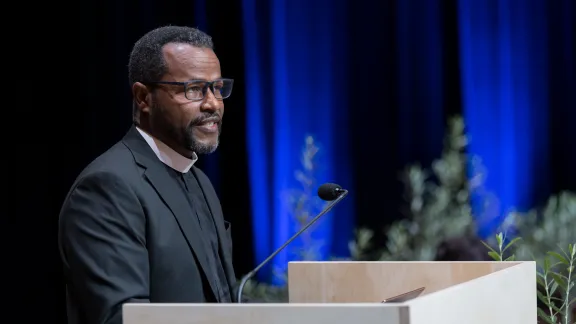
Rev. Dr Bruk Ayele, president of the Mekane Yesus seminary in Ethiopia speaks as part of a thematic plenary of the theme of 'One Spirit', at the LWF Thirteenth Assembly. Photo: LWF/Albin Hillert
MYS is the higher theological training institution of the Ethiopian Evangelical Church Mekane Yesus (EECMY) which, numbering over 12 million members, is the largest of the 150 Lutheran churches making up the global LWF communion. It is a very diverse church, representing different Lutheran and Reformed liturgical traditions, with congregations comprising people from the different ethnic and linguistic backgrounds of the country.
Speaking at the second of three plenary sessions addressing the assembly theme, ”One Body, One Spirit, One Hope,” Asale began by noting that the churches’ call to unity is urgent today, just as it was at the time of St Paul when there was “fragmentation and disintegration among God’s children.”
The call to “oneness in spirit is indispensable because all churches sincerely confess and preach that they belong to Christ.”
Rev. Dr Bruk Ayele Asale, President of Ethiopia’s Mekane Yesus seminary.
Reflecting on some of the spirits that cause suffering and division in today’s world, he pointed to “the global systemic oppression, the divide between North and South, East and West, the brutality of the powerful and an endless cry of the powerless.” He spoke about conflicts such as the civil war in his own country, as well as fighting between ethnic groups and clans which have caused deaths and the destruction of churches. “This is the outcome of a spirit of hatred,” he said, “a spirit that is opposed to unity and the Holy Spirit.”
In the religious arena, he noted the “countless misleading theologies” which are used to exploit and control the poor and vulnerable, violating “inherent human dignity, putting the life of people in danger.” This is a problem in many parts of the world, he said, mentioning the recent case in Kenya, where hundreds of followers died from starvation after the cult leader persuaded them to fast to death.
The call to “oneness in spirit is indispensable,” Asale affirmed, “because all churches sincerely confess and preach that they belong to Christ and live for the cause of the gospel.” This call to unity, he continued, refers primarily to the “multidimensional movement of churches and Christians, whose goal is both the visible unity of the churches and an integration of mission, service, and renewal.”
Openness, mutual respect, common goal
Looking back at the history of the ecumenical movement, begun over a century ago, he noted how the search for “oneness in spirit among the churches can and should be built on global, regional and local levels.” It does not mean “succumbing to the identity of the other, he said, but “rather it is about treating all equally and fairly,” realizing that member churches and entire global communions need the collaboration of others in order to confront the challenges of our times.
Progress on the path to unity, he said, requires openness or “readiness to be changed and renewed by what one learns from the other.” Secondly, it requires mutual respect to overcome negative stereotyping and “the tendency to demonize the other without justification.” Thirdly, it requires recognition that all churches share a common goal, “namely serving and worshiping the same Lord to whom the church belongs.”
Though “we may be divided institutionally or physically,” Asale concluded, “we can continue being one in the Spirit, a mystical way of life we experience when we are living in Christ’s union.”
Responses from Chile and Finland
Responding to Asale’s presentation, Bishop Izani Bruch, Evangelical Lutheran Church in Chile, stressed “how important this unity in the Spirit has been” in her context as leader of a minority church in Latin America. Being part of the LWF “empowers us and sustains us,” she said, because “we know that we are accompanied by the communion of 150 churches and by more than 77 million Lutherans and other churches.” She pointed to the vital support provided by the LWF and the World Council of Churches during 17 years of dictatorship in Chile.
Bruch spoke of the ongoing challenges in her region, including poverty and injustice, exclusion and polarization, hate speech and growing political and religious fundamentalism, as well as misleading theologies that have led to a push back on human rights. In the face of these challenges, she said, “unity in the Spirit is an evangelical mandate, not an option.”
Between heaven and earth
In a second response, Finnish theologian and professor at Fuller Theological Seminary in the United States, Rev. Dr Veli-Matti Kärkkäinen, drew inspiration from a verse in the book of Ezekiel: “The Spirit lifted me up between earth and heaven” [Ez 8:3]. From this place, Kärkkäinen said, “we will hear the cries of the Spirit in the midst of enormous suffering and pain,” learning how to discern “between the One Spirit of God and the many other spirits [….] of violence, oppression and greed.”
Basing his words on the acronym of Luther’s name, he spoke firstly of Latitude, how “the Spirit makes room, creates space […] in a world of narrow-minded attitudes and postures.” Secondly, he spoke of the need for Unity in the One Spirit, “not forced uniformity,” but rather unity in diversity. Thirdly, he talked of the spirit of Tenacity, or “the capacity to stand firm for what is right and what is good for all people, all Christians.”
Fourthly, Kärkkäinen reflected on the need for Heartfulness, that is “listening to what the gentle voice of the Spirit is speaking to your heart.” Next, he spoke about Empowerment, or the way the Spirit “empowers the church for prophetic speech and for healing the sick.” Finally, he talked about the need for “ever-continuing, fresh Reformation, which was the theme explored at the previous LWF Assembly in 2017.”
Ethiopian seminary president speaks at second of three Assembly sessions on ‘One Body, One Spirit, One Hope’
“Unity is in the nature of the church,” therefore the task of Christians is to nurture “oneness in spirit” through open, respectful dialogue in pursuit of a common goal. That message was at the heart of a presentation by Rev. Dr Bruk Ayele Asale, President of the Mekane Yesus Seminary (MYS) in Ethiopia, to participants in The Lutheran World Federation (LWF) Thirteenth Assembly in Kraków, Poland.
Church leaders and representatives from across the world are gathered for the 13 to 19 September Assembly, LWF’s highest decision-making body.

Rev. Dr Bruk Ayele, president of the Mekane Yesus seminary in Ethiopia speaks as part of a thematic plenary of the theme of 'One Spirit', at the LWF Thirteenth Assembly. Photo: LWF/Albin Hillert
MYS is the higher theological training institution of the Ethiopian Evangelical Church Mekane Yesus (EECMY) which, numbering over 12 million members, is the largest of the 150 Lutheran churches making up the global LWF communion. It is a very diverse church, representing different Lutheran and Reformed liturgical traditions, with congregations comprising people from the different ethnic and linguistic backgrounds of the country.
Speaking at the second of three plenary sessions addressing the assembly theme, ”One Body, One Spirit, One Hope,” Asale began by noting that the churches’ call to unity is urgent today, just as it was at the time of St Paul when there was “fragmentation and disintegration among God’s children.”
The call to “oneness in spirit is indispensable because all churches sincerely confess and preach that they belong to Christ.”
Rev. Dr Bruk Ayele Asale, President of Ethiopia’s Mekane Yesus seminary.
Reflecting on some of the spirits that cause suffering and division in today’s world, he pointed to “the global systemic oppression, the divide between North and South, East and West, the brutality of the powerful and an endless cry of the powerless.” He spoke about conflicts such as the civil war in his own country, as well as fighting between ethnic groups and clans which have caused deaths and the destruction of churches. “This is the outcome of a spirit of hatred,” he said, “a spirit that is opposed to unity and the Holy Spirit.”
In the religious arena, he noted the “countless misleading theologies” which are used to exploit and control the poor and vulnerable, violating “inherent human dignity, putting the life of people in danger.” This is a problem in many parts of the world, he said, mentioning the recent case in Kenya, where hundreds of followers died from starvation after the cult leader persuaded them to fast to death.
The call to “oneness in spirit is indispensable,” Asale affirmed, “because all churches sincerely confess and preach that they belong to Christ and live for the cause of the gospel.” This call to unity, he continued, refers primarily to the “multidimensional movement of churches and Christians, whose goal is both the visible unity of the churches and an integration of mission, service, and renewal.”
Openness, mutual respect, common goal
Looking back at the history of the ecumenical movement, begun over a century ago, he noted how the search for “oneness in spirit among the churches can and should be built on global, regional and local levels.” It does not mean “succumbing to the identity of the other, he said, but “rather it is about treating all equally and fairly,” realizing that member churches and entire global communions need the collaboration of others in order to confront the challenges of our times.
Progress on the path to unity, he said, requires openness or “readiness to be changed and renewed by what one learns from the other.” Secondly, it requires mutual respect to overcome negative stereotyping and “the tendency to demonize the other without justification.” Thirdly, it requires recognition that all churches share a common goal, “namely serving and worshiping the same Lord to whom the church belongs.”
Though “we may be divided institutionally or physically,” Asale concluded, “we can continue being one in the Spirit, a mystical way of life we experience when we are living in Christ’s union.”
Responses from Chile and Finland
Responding to Asale’s presentation, Bishop Izani Bruch, Evangelical Lutheran Church in Chile, stressed “how important this unity in the Spirit has been” in her context as leader of a minority church in Latin America. Being part of the LWF “empowers us and sustains us,” she said, because “we know that we are accompanied by the communion of 150 churches and by more than 77 million Lutherans and other churches.” She pointed to the vital support provided by the LWF and the World Council of Churches during 17 years of dictatorship in Chile.
Bruch spoke of the ongoing challenges in her region, including poverty and injustice, exclusion and polarization, hate speech and growing political and religious fundamentalism, as well as misleading theologies that have led to a push back on human rights. In the face of these challenges, she said, “unity in the Spirit is an evangelical mandate, not an option.”
Between heaven and earth
In a second response, Finnish theologian and professor at Fuller Theological Seminary in the United States, Rev. Dr Veli-Matti Kärkkäinen, drew inspiration from a verse in the book of Ezekiel: “The Spirit lifted me up between earth and heaven” [Ez 8:3]. From this place, Kärkkäinen said, “we will hear the cries of the Spirit in the midst of enormous suffering and pain,” learning how to discern “between the One Spirit of God and the many other spirits [….] of violence, oppression and greed.”
Basing his words on the acronym of Luther’s name, he spoke firstly of Latitude, how “the Spirit makes room, creates space […] in a world of narrow-minded attitudes and postures.” Secondly, he spoke of the need for Unity in the One Spirit, “not forced uniformity,” but rather unity in diversity. Thirdly, he talked of the spirit of Tenacity, or “the capacity to stand firm for what is right and what is good for all people, all Christians.”
Fourthly, Kärkkäinen reflected on the need for Heartfulness, that is “listening to what the gentle voice of the Spirit is speaking to your heart.” Next, he spoke about Empowerment, or the way the Spirit “empowers the church for prophetic speech and for healing the sick.” Finally, he talked about the need for “ever-continuing, fresh Reformation, which was the theme explored at the previous LWF Assembly in 2017.”
